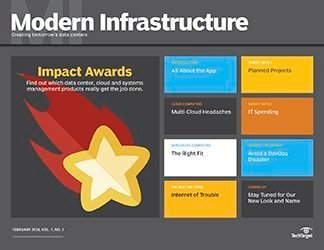PRO+ Premium Content/Modern Infrastructure
Access your Pro+ Content below.
Why deploying APIs on serverless frameworks spurs innovation

This article is part of the Modern Infrastructure issue of February 2018, Vol. 7, No. 1
Like Cinderella's slipper, serverless computing doesn't fit every foot in software development, but -- for the right application -- it offers royal opportunity. Serverless computing provides a code and API deployment option for companies trying to reach more customers, grow their businesses and serve people in new and innovative ways -- without having to scale IT overhead. Serverless provides a deployment platform that, according to Gartner analyst Martin Reynolds, is "absolutely bulletproof" and guaranteed to deliver reliable, consistent results without losing information. For software pro Chris Moyer, building and deploying APIs on a serverless framework has been a good step. Doing so makes the API lightweight on the client side, scalable on the cloud, easier to secure and less expensive. In his role as CTO of marijuana-license tracking and research firm Cannabiz Media, Moyer chose to deploy a serverless API that has to respond to requests quickly. That approach makes sense because the API doesn't need a cloud instance's ...
Features in this issue
-
Multi-cloud management still a work in progress for IT teams
Multi-cloud deployments are a mixed bag, providing both business value and complex management challenges. Fortunately, a number of third-party management tools can help.
-
Why deploying APIs on serverless frameworks spurs innovation
Explore why deploying APIs on serverless frameworks can help businesses grow faster and provide innovative services while decreasing developers' workloads and lowering IT costs.
Columns in this issue
-
Rely on the DevOps methodology to avoid disaster
DevOps concepts rely on both developers and operations to uphold the stability of applications in production. One side can't do it alone.
-
What's our future if we don't secure IoT devices?
When everything from the coffee maker to the manufacturing plant's robots to the electric grid is connected, shouldn't security be IT's primary concern?
